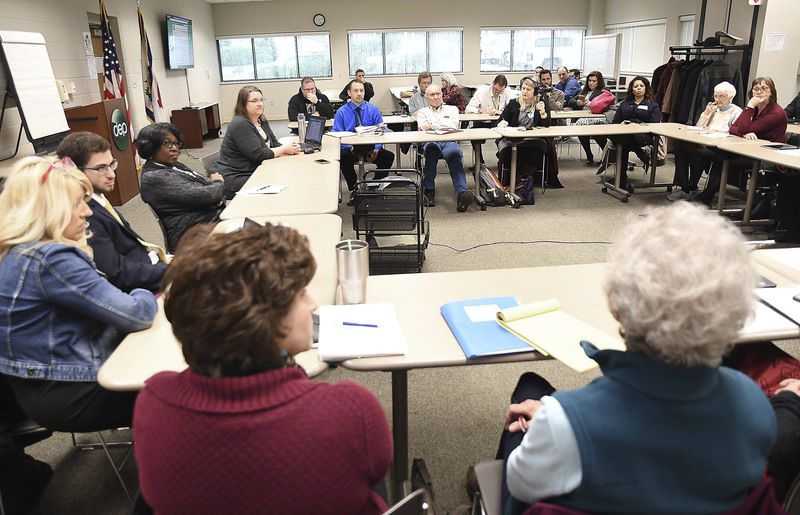Citizens, Advocates Criticize West Virginia DEP for Failing to Defend Water Quality Standards

By Erin Beck
January 19, 2019 - About 30 people turned out for a public listening session Thursday at the Department of Environmental Protection, with most criticizing the DEP for recently opting not to defend its own proposal to update water quality standards.
After the federal Environmental Protection Agency recommended West Virginia update standards for amounts of pollutants allowed in West Virginia rivers and streams in 2015, the DEP released last year its proposal to update about 60 of those standards.
For about two-thirds of the standards, less pollution would have been permitted in West Virginia waterways. For about one-third, more pollution would have been allowed.

Laura Cooper, Assistant Director Division of Water DEP, fourth from left, listens to remarks during a public hearing on water quality.
By Rick Barbero, The Register-Herald
But in late November, at the request of the West Virginia Manufacturers Association, the state lawmakers who were members of a joint rule-making committee decided to leave the standards the way they are instead, at levels enacted in the 1980s.
Thursday, the DEP held a public meeting at its Kanawha City office on those standards. The rule-making committee's decision, as well as the DEP's decision not to defend its own proposal before the committee, was widely chastised. Some had driven hours to attend.
Laura Cooper, the DEP's assistant director in the division of water and waste management, said the DEP "was just there to answer questions of the committee, and that's what we did," adding that those concerned could watch video online to learn more about what transpired at that meeting.
The EPA considers body weight, fish consumption and water consumption, among other things, when developing water quality standards, based on the assumptions that people who eat less fish and drink less water are less likely to be exposed to the pollutants, and heavier bodies can handle more pollution.
During the meeting, Jeanette Rowsey of Huntington made reference to the Manufacturers Association argument, that West Virginia should consider state-specific data before implementing new standards because West Virginians are more likely to be heavier, eat less fish and drink less water.
"Is this implying that this makes West Virginians somehow immune or impervious to carcinogens and other pollutants," she said, "or does this make the safety of all West Virginians less important because some people already have bad health outcomes?"
Cooper responded that the EPA allows state or regions to use state-specific data.
“Would you take your child to a pediatrician that’s still relying on what the books said back in 1985?” said another attendee, Holly Cloonan.
Cooper referred her to the DEP’s response to public comments.
"We have some of the worst health in the country and what we need to do is make sure our water quality isn’t exacerbating that," Maya Nye, a doctoral student at WVU’s School of Public Health, said by conference call.
She added that racial minorities tend to live in areas more highly burdened by industrial pollution.
The committee's decision still needs to be approved by the full Legislature, which convened last week. Environmental advocates say they expect the Senate Energy, Industry and Mining Committee to take up the legislation Tuesday.
Several attendees said they want DEP Secretary Austin Caperton, a former coal industry consultant, and Deputy Secretary Scott Mandirola to appear before lawmakers and defend stronger standards.
Angie Rosser, director of the West Virginia Rivers Coalition, accused the DEP of "kicking the can."
"It appears that the DEP, a state agency serving the people of West Virginia, whose task is to protect public health and the environment, is being complicit in a tactic to stall these updates... How long is this process going to keep going while we're living in the 1980s?"
She asked if agency leadership planned to approach lawmakers this week and recommend more protective standards, after all.
Cooper paused.
"I can't really say today exactly what we're going to do because we just have started to listen to you all — one more time," she said. "I don't know what the decision will be."
Cooper said she always is in favor of seeking more information and couldn't say what their position would be after they "digest the information."
Karan Ireland, government affairs director for the West Virginia Environmental Council, noted that time to "digest information" implied the DEP wouldn't be defending its original proposal before lawmakers this week.
"I don't know what will be asked or what will be said on Tuesday," Cooper responded.
Representatives of the West Virginia Manufacturers Association were also present. They've argued that other states also haven't yet implemented new water quality standards, and that straight pipe sewage is a bigger problem in West Virginia rivers.
They have contracted an employee to conduct a study incorporating state-specific information.
Deputy Secretary Mandirola said he didn't think the state-specific study could be done by the end of the legislative session.

